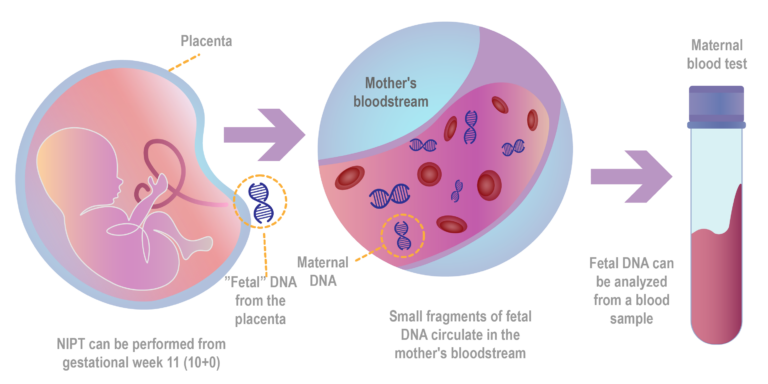A pregnant woman has DNA from her fetus in her bloodstream. A female fetus, like her mother, has the sex chromosome pair X+X. A male fetus, on the other hand, has X+Y.
If Y chromosomes are found in the blood sample from the expectant mother, it means she is carrying a male fetus. If no Y chromosomes are found, she is carrying a female fetus.
The analysis is 99% accurate.
Choose our simple and painless home sampling kit and perform the test at home. Read more here.
You can also choose to visit one of our affiliated clinics for sample collection by healthcare professionals. Read more here.
Genderscreen tests are sent to our affiliated laboratory in Gothenburg.
When can you expect the results?
The result will be sent 7 days after the sample arrives at the laboratory.
How do you receive the result?
The result will be sent to your provided email address, with instructions on how to download it from the Genderscreen platform.
Gather family and friends to celebrate with our Gender Reveal video.
• you have not received a blood transfusion in the past 4 months
• you have not undergone an organ transplant, bone marrow transplant, or similar procedure
• you do not have, or are not being evaluated for, a malignant cancer
• the ultrasound examination did not show any suspicion of Vanishing Twin Syndrome
• you are not being treated with immunomodulatory medication
• you are aware that the test cannot determine the sex of the babies if you are expecting fraternal (dizygotic) twins
The test cannot distinguish between the mother’s and the fetus’s X chromosomes; if a woman takes the test and does not have an active viable pregnancy, she will receive a result indicating she is carrying a female fetus. Thus, the test is not a pregnancy test and cannot replace other early pregnancy examinations.
The test cannot guarantee that the pregnancy is viable, and not all miscarriages present with immediate symptoms (a so-called missed miscarriage). This means that a person taking the test could theoretically receive a result even if the pregnancy has ended. Therefore, the test cannot guarantee that the pregnancy is developing normally. An ultrasound examination is recommended in conjunction with the test to minimize this risk.
If a Y chromosome is identified in a woman expecting twins, it can only be confirmed that one of the fetuses is a boy. It is impossible to know whether the twins are identical or fraternal. If no Y chromosome is found, both fetuses are female, but it remains unclear whether they are identical or fraternal. If it is known that identical twins are expected, the result applies to both fetuses.
If the sample does not arrive at the laboratory within 6 days, it may become unusable for analysis. Therefore, it is essential to ensure that the sample is sent to the laboratory on the same day as the sample is collected, according to our instructions.
